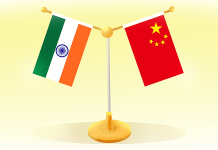On May 10, 2025, U.S. President Donald Trump announced on Truth Social that his administration brokered a ceasefire between India and Pakistan following intense clashes sparked by India’s Operation Sindoor, a May 7–8 strike on terrorist sites in Pakistan and Pakistan-occupied Kashmir (PoK). Trump further offered to mediate a “solution” to the Kashmir dispute, prompting sharp rebuttals from India, which insists Kashmir is a bilateral issue. This article examines whether Trump’s claims challenge India’s long-standing Kashmir policy, the diplomatic fallout, and broader implications.
In This Article:
Trump’s Claims and India’s Response
Trump’s May 10 post claimed a “historic and heroic” U.S.-mediated ceasefire after four days of Indo-Pak strikes, triggered by the April 22 Pahalgam attack killing 26 tourists. He reiterated his mediation offer on May 13, suggesting trade leverage and a resolution to the “thousand-year” Kashmir conflict. India’s Ministry of External Affairs (MEA), via spokesperson Randhir Jaiswal, firmly rejected mediation, stating, “Issues pertaining to Jammu and Kashmir are addressed bilaterally. The outstanding matter is Pakistan’s illegal occupation of Indian territory.” Jaiswal clarified the ceasefire was negotiated via Directors-General of Military Operations (DGMOs) on May 10, not U.S. intervention, and denied Trump’s trade claims.
India’s Kashmir Policy: A Non-Negotiable Stance
India’s policy, rooted in the 1972 Simla Agreement, mandates bilateral resolution of Kashmir issues, rejecting third-party mediation. New Delhi views Kashmir as an integral part, with PoK as illegally occupied, and conditions talks with Pakistan on ending cross-border terrorism. Trump’s offer, welcomed by Pakistan’s PM Shehbaz Sharif, internationalizes the dispute, aligning with Islamabad’s push for U.N. resolutions and Kashmiri self-determination. Indian analysts like Brahma Chellaney argue Trump’s intervention shifts focus from Pakistan’s terrorism to Kashmir, undermining India’s narrative. Congress leader Shashi Tharoor called the remarks “deeply disappointing,” warning they re-hyphenate India-Pakistan globally, reversing decades of diplomatic gains.
Do the claims weaken India’s policy?
Trump’s statements challenge India’s policy by suggesting external involvement, a taboo in New Delhi. His 2019 claim that PM Narendra Modi requested mediation was swiftly denied, and the current offer revives that friction. The U.S. portrayal of a “nuclear conflict” averted, despite India’s conventional Operation Sindoor, risks amplifying Pakistan’s narrative, as noted by analyst Michael Kugelman. Domestic critics, including Congress’ Jairam Ramesh, question if the ceasefire signals a policy shift, exposing Modi to rare political scrutiny.
Diplomatic and Regional Implications
Trump’s remarks strain India-U.S. relations, with New Delhi wary of Washington’s trade threats amid ongoing tariff talks. Pakistan’s embrace of mediation risks prolonging tensions, as India refuses talks without terrorism cessation. Analysts like Shyam Saran note that broadening talks to Kashmir or water-sharing treaties could spark domestic backlash for Modi. The Hindu suggests India must deliver “tough messaging” to preserve credibility, especially as China-Pakistan ties raise U.S. concerns. For lasting peace, experts like Praveen Donthi advocate including Kashmiris in negotiations, a step neither nation currently entertains.
Balancing Act Ahead
Trump’s claims test India’s diplomatic resolve but don’t dismantle its Kashmir policy. New Delhi’s firm stance, backed by global recognition of Pakistan’s terrorism role, mitigates the impact. Yet, the episode underscores the need for India to navigate U.S. relations carefully, balancing trade and defense ties with its non-negotiable Kashmir position. As X user @RpsAgainstTrump noted, such interventions highlight global risks when U.S. leadership wavers.
-By Manoj H




